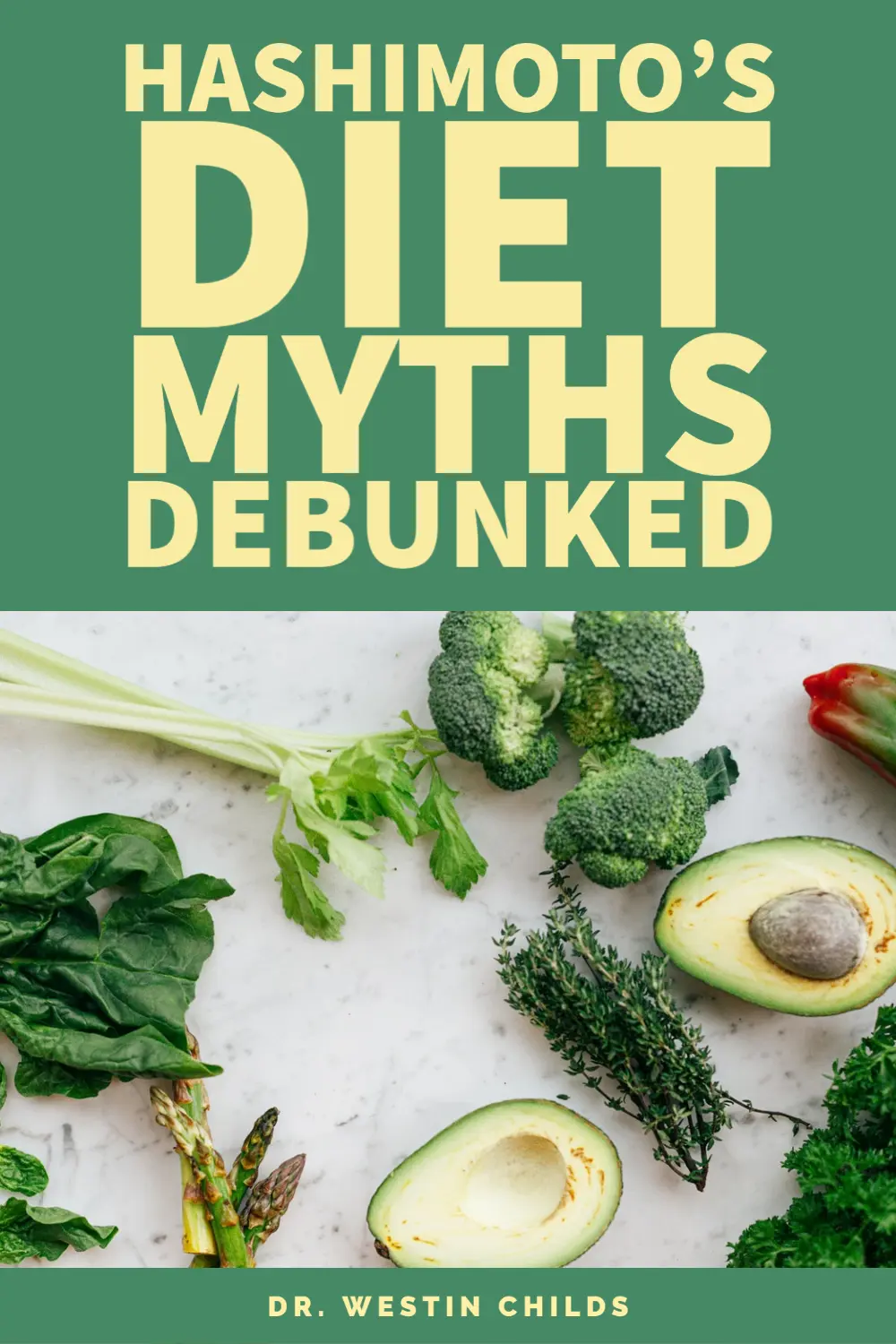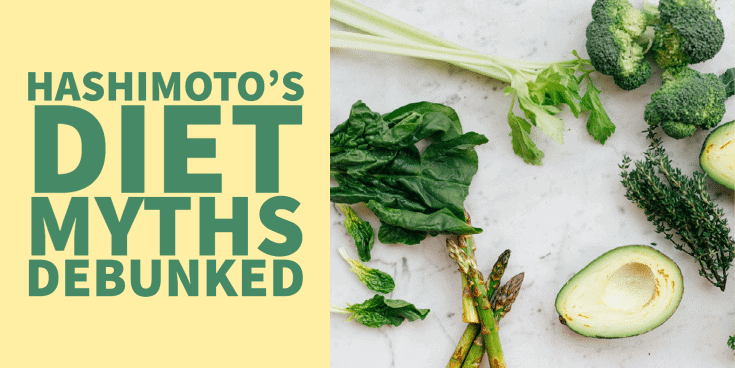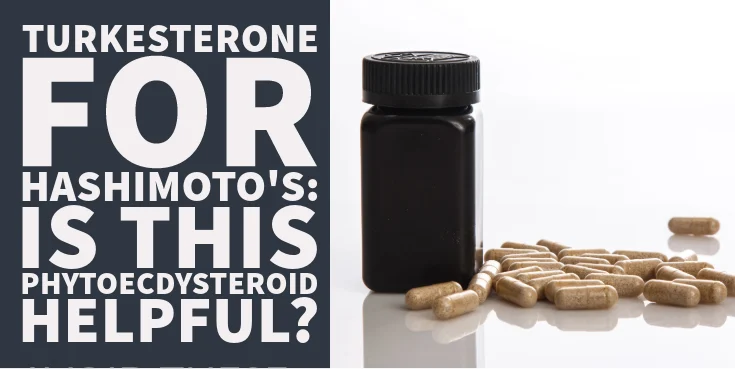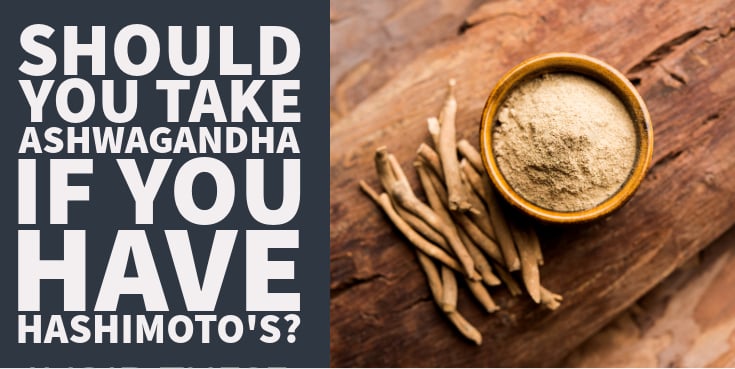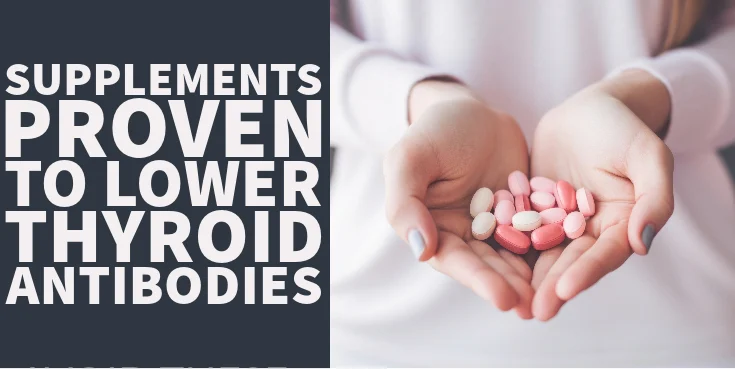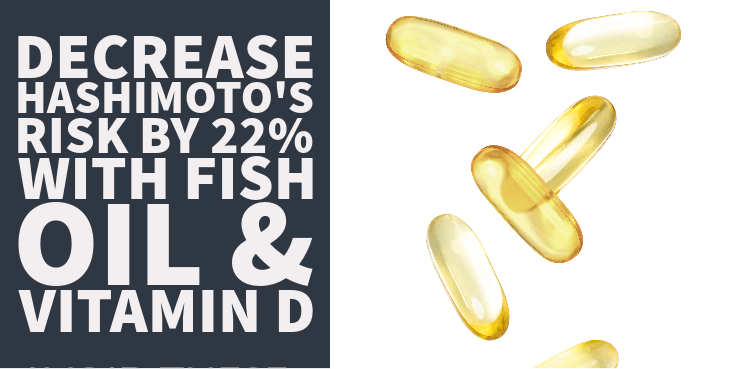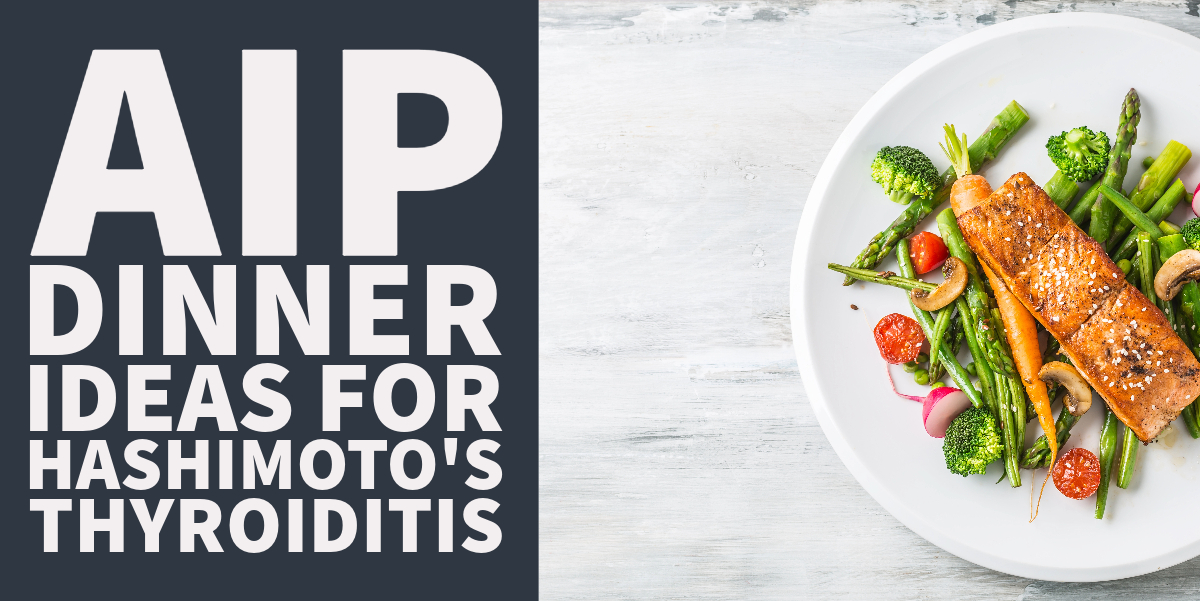The Food you Eat Can and Does Impact Hashimoto’s Thyroiditis
The food that you put into your mouth and into your body can either have a positive or negative impact on Hashimoto’s thyroiditis.
I’m definitely not disputing that.
But in this article, I want to dispute some of the so-called “facts” that float around the internet, Facebook groups, and other forums, regarding how effective diet CAN be for treating and managing Hashimoto’s.
I’ve had the advantage of treating hundreds with Hashimoto’s personally and getting into contact with thousands more through this blog, emails, Facebook comments, youtube comments, podcasts, and more.
What I’ve learned other the last 5-6 years is that there are all sorts of ideas about how food can both positively and negatively impact thyroid function in the setting of Hashimoto’s.
Some of these ideas are absolutely true, others are mostly false but contain kernels of truth, and others are just completely false.
And yet, even the obviously false information is often passed down from person to person on the internet as the gospel truth!
Today we are going to dispel some of these Hashimoto’s food-related myths and talk about what you can and should expect from your diet.
You will learn…
- The top 7 most common Hashimoto’s food myths
- The types of food which are actually harmful if you have Hashimoto’s thyroiditis
- The nuances associated with diet and certain types of foods such as dairy
- The story on iodine and how that impacts Hashimoto’s
- Whether or not the AIP diet is the “best” diet around for treating Hashimoto’s
- And much much more
Let’s jump in:
DOWNLOAD FREE RESOURCES
Foods to Avoid if you Have Thyroid Problems:
I’ve found that these 10 foods cause the most problems for thyroid patients. Learn which foods you should avoid if you have thyroid disease of any type.
The Complete List of Thyroid Lab tests:
The list includes optimal ranges, normal ranges, and the complete list of tests you need to diagnose and manage thyroid disease correctly!
The Top 7 Hashimoto’s Food Myths Debunked
This list has been curated based on my own experience in treating patients with Hashimoto’s and also based on the many interactions I’ve had with people who have Hashimoto’s.
As such, it’s not meant to be an all-encompassing list that includes every single dietary myth out there.
If you have any other “facts” that you’ve heard about but aren’t 100% sure are accurate then please leave a comment below and I can continually add to this list.
But without further ado, let’s jump into the top 10 most common Hashimoto’s food myths:
#1. Changing my Diet can Heal or Reverse my Hashimoto’s and it’s all I need to do.
The first on the list is probably the most common and it stems from the idea that diet is sufficient to heal just about any malady out there.
While there is no doubt in my mind that diet plays a key role in regulating the body and overall health, I’ve never seen evidence that there is some combination of certain foods which if consumed at the right time of the day or prepared in the right way, will heal any medical condition.
The idea is very alluring because, in essence, it promises that fixing your thyroid autoimmune condition is within reach if you can just unlock the mysterious food code.
And because you have control over whatever you put into your mouth it means that you potentially have control over your thyroid condition.
There’s only one problem:
It doesn’t quite work that well.
But I can tell you after exhausting just about every combination of food, doing just about every food allergy and sensitivity test available on the market, that this just isn’t true for every single person.
To make things worse, the idea that food can fix or heal Hashimoto’s will sometimes force people into psychological pathology.
There is a medical condition given to people who obsess over healthy eating and it’s called orthorexia (1).
Being consumed with eating healthy actually CAUSES you to be unhealthy!
It can cause extreme mental stress which can be felt somatically exacerbating autoimmunity and increasing inflammatory (2) levels in the body.
I can almost always tell when someone has an unhealthy obsession with healthy eating based on the questions they ask and the importance they place on their diet.
Diet IS important but it isn’t the ONLY thing you should be thinking about.
Over-the-counter supplements, thyroid hormones, exercise, stress reduction, sleep, and off label medications are often even more important!
But don’t get me wrong, it is absolutely possible for diet to heal and reverse Hashimoto’s in SOME cases.
The key here is SOME cases and not ALL cases.
Focus on your diet but not to the point that it causes pathology in your body.
#2. Once I get my Hashimoto’s under control I will be able to eat like my friends.
This is probably the most frustrating myth but it is something that you should be aware of.
If you’ve been diagnosed with Hashimoto’s then the chances of you eating like your friends who do NOT have autoimmune disease is basically zilch.
The unfortunate truth is that those who have Hashimoto’s will always need to be cautious and aware of the foods that they put into their body.
What do I mean?
It means that if you and your friends go out to eat for lunch or dinner you shouldn’t be splitting that deep dish pizza with some beer on the side.
Or when your friends go out to get their morning latte it’s far better for you to politely decline and instead go for some herbal tea.
What you need to understand is that even though you may be consuming the same foods as your friends, that food is impacting your body DIFFERENTLY than it is impacting theirs.
Processed foods with industrial seed oils can trigger inflammation in YOUR body which can make your autoimmune disease worse.
Drinking alcohol may have a suppressive effect on YOUR thyroid gland which will be felt much more strongly than it would be in your friends.
Consuming coffee in the morning may reduce the absorption of YOUR thyroid medication whereas your friends will otherwise be fine.
This is true even if you have your Hashimoto’s under control, by the way!
For the rest of your life, you should be both aware and cognizant of the impact that your diet will have on your thyroid condition.
But let me be clear, this doesn’t mean you can’t enjoy life. It just means you need to find different ways to partake in the fun!
Nowadays, there are all sorts of gluten-free, dairy-free, and soy-free alternatives to modern-day foods and even though they may not be healthy, they are still far less damaging to the body than the regular food you’d get when eating out.
#3. I don’t have to avoid gluten because I don’t have Celiac Disease.
Another common misconception has to do with who should be eating gluten and who shouldn’t be eating gluten.
Most people wrongfully assume that gluten only needs to be avoided if you have Celiac disease.
Celiac disease is an autoimmune disease that REQUIRES the absolute removal of gluten from the diet.
If you have Celiac disease and you consume gluten your body will create antibodies to it which will destroy the lining of your gut and lead to all sorts of problems.
Both doctors and patients know this and they also know that you can test for Celiac disease by checking some simple blood tests.
So the obvious conclusion is that if you DON’T have these antibodies in your blood (meaning you do NOT have Celiac disease) then it’s safe to eat gluten, right?
Wrong, actually, and this is where people get into trouble.
While Celiac is a big problem for people with Hashimoto’s there is a more sinister problem known as non-celiac gluten sensitivity (3).

These are people who test NEGATIVE for Celiac disease but still have a sensitivity to gluten which can cause problems if consumed.
For this reason, it’s almost always a good idea to completely remove gluten from your diet if you have Hashimoto’s for at least 90 days regardless of what your blood tests show.
I believe in this so strongly that I rarely ever order gluten antibodies on patients unless I know that they have been consuming gluten before the test.
I just assume that avoiding gluten will be beneficial to the patient and just about 100% of the time it is.
If you have Celiac disease then avoiding gluten is great, if you have non-celiac gluten sensitivity then avoiding celiac is great, and avoiding easily processed foods that contain gluten is always a good idea for better health in general.
It’s pretty much a win, win, win, no matter how you look at it.
Not everyone will have to avoid gluten forever, though, so keep that in mind.
Rarely, do I run across someone with Hashimoto’s that can tolerate gluten, especially in the form of Einkorn grains.
But figuring that out is something you should do down the road once you get your Hashimoto’s under control.
Don’t play around with your health in the beginning while you are trying to get your Hashimoto’s under control.
#4. AIP Is the Best Diet if you have Hashimoto’s.
Next up has to do with which diet is BEST if you have Hashimoto’s.
There are a lot of people out there who will tell you that hands down the best diet for managing Hashimoto’s is the AIP diet.
If you’ve never heard of the AIP diet, allow me to explain.
AIP stands for the autoimmune protocol and autoimmune paleo diet.
In a nutshell, this diet is a stricter version of paleo which acts as a quasi-elimination diet that removes pretty much any chance you will have some sort of reaction or sensitivity to the foods that you eat.
And while it is extremely effective (4), it’s also overkill for most people.
I’ve written about why I typically don’t recommend the AIP for most people with Hashimoto’s in previous articles so I would encourage you to check those out if you want more in-depth information.
For the purposes of this article, allow me to briefly explain.
Consider this analogy:
Imagine you are trying to get rid of ants in your backyard.
You have the option of using some non-toxic bug spray or the option of using a hand grenade.
Both options work, it’s just that one is considerably more destructive and much more than is necessary to get the job done.
In this analogy, the non-toxic bug spray is the gluten-free, dairy-free, and soy-free diet while the hand grenade is the AIP diet.
For MOST people, the AIP diet is overkill and not required.
Even though it works well, it can cause all sorts of issues including increased sensitivities to food down the road as you start to incorporate them back into your diet as well as issues with non-compliance.
More important than getting on a diet to treat Hashimoto’s is STAYING on a diet to treat Hashimoto’s.
What good is your diet if you can only stick to it for 30 days before you revert back to normal?
It would be far more effective in the long run to pick a less intensive diet but one that is easier for you to stick with.
Make sure you consider all of these factors before you jump into any diet to treat and manage Hashimoto’s.
#5. Ashwagandha is harmful if you have Hashimoto’s.
This one isn’t super popular but there are certainly some people out there who believe that ashwagandha is harmful if you have Hashimoto’s thyroiditis.
This stems from the idea that Ashwagandha is technically a member of the nightshade family and nightshades are one of those “must remove” foods if you have autoimmune diseases such as Hashimoto’s thyroiditis.
It doesn’t help the situation that nightshades are not allowed if you are following the AIP diet, so this gives people more ammunition for this myth.
The logic is that consuming ashwagandha will cause inflammation which will worsen autoimmune function and make your thyroid worse.
But is this true?
I have to say that it sounds plausible when you are talking purely in the hypothetical sense, but it just doesn’t seem to matter clinically.
I rarely ever think twice about using ashwagandha in patients with Hashimoto’s and I’ve never had a problem to date.
In addition, many of my own thyroid supplements (including those I recommend for Hashimoto’s) contain ashwagandha!
I can look at the number of bottles sold and compare it to the side effects that people email me about when using my supplements.
And I can tell you after providing supplements to over 40,000 patients with thyroid problems and Hashimoto’s that this just isn’t a problem.
Does this mean it can’t cause issues for some people?
There’s always a possibility that YOU may as an individual may have problems but the idea that everyone with Hashimoto’s should avoid it isn’t really founded or warranted.
Don’t avoid ashwagandha just because you have Hashimoto’s but always pay attention as you take supplements to see if they work for YOU.
#6. Iodine must be avoided 100% if you have Hashimoto’s.
This is a myth that I feel will be around for years and years to come!
There is this idea that the use of iodine is harmful to people with Hashimoto’s because it may trigger (or at least contribute) to autoimmune thyroid disease.
There’s only one problem with this theory and it’s called human physiology.
As much as you may hate iodine it is required for life and cannot be produced by the human body.
Without iodine, your body simply cannot produce thyroid hormone.
And if you don’t produce thyroid hormone, you won’t be living very long.
There is no shortage of people who tell me that they don’t respond well to iodine or iodine found in supplements and that they are somehow allergic to iodine.
But what these people don’t realize is that iodine is found in all sorts of common foods including foods like bananas, strawberries, milk, tuna, eggs, turkey, yogurt, and canned corn.
The chances are incredibly high that you are consuming iodine found in THESE foods on probably a daily basis!
So how is it possible for you to be allergic to iodine when you are consuming it in foods on almost a daily basis and it is required for life?
While it’s highly unlikely that you are truly allergic to iodine, it may be that using various doses of iodine from non naturally occurring sources CAN cause some issues.
This is true, but the default position that you should take is that iodine is both necessary and required even if you have Hashimoto’s.
You can figure out later if you need to adjust how much you are taking or from what sources you are getting your iodine.
But avoiding iodine because you believe it is harmful is most likely going to cause more harm than good to your body.
And, again, I have lots of data from providing patients with thyroid supplements that contain iodine.
It’s very rare that I see people have truly negative reactions to iodine.
So rare, in fact, that it’s probably close to 1 in 5,000 or 1 in 10,000.
The chances are very much in your favor that you will handle taking iodine if you have Hashimoto’s without any issue.
#7. Cutting my Calories is the Best Way to Lose Weight.
There is this idea that the best and only way to lose weight is by cutting your calories.
This path to weight loss has been rehashed time and time again by doctors, patients, Instagram celebrities, Facebook groups, and the news.
It’s particularly attractive to those with Hashimoto’s because people who have Hashimoto’s often have issues with weight gain.
The same people who have problems with weight turn to diet and calories as a solution.
The problem with their weight gain isn’t from their diet, though, and is instead from being undertreated for their thyroid problem.
It should come as no surprise to you that most people with Hashimoto’s are not treated correctly.
I’m sure you have experienced this issue during the course of your disease.
How easy was it for you to get diagnosed? How easy was it for you to get put on thyroid medication? Did you actually feel better when you started your levothyroxine? Did you gain weight before you were diagnosed? Did that weight gain come off when you started treatment?
If you answer these questions honestly then you should have no problem coming to the conclusion that doctors often fail patients with Hashimoto’s.
And if you wanted more proof then you can always check out the surveys done on tens of thousands of other patients who feel the same way.
The bottom line is that most patients with Hashimoto’s are NOT treated correctly and their weight gain is a reflection of this issue.
What this means for you is that no amount of calorie restriction is going to fix the problem when the problem is your thyroid!
In fact, the opposite is usually true.
Calorie restriction, especially yo-yo dieting, causes a reduction in circulating free T3 (5), causes an elevation in reverse T3, and may reduce your metabolism!
Instead of trying to cut your calories, focus on a regular and normal amount of calories full of whole foods.
This will at least may improve thyroid function by reducing inflammation.
Weight loss will come as you focus on improving your thyroid and NOT when you cut your calories.
Wrapping it Up
The bottom line?
Be careful about what types of foods that you eat but don’t obsess over those foods.
At the end of the day, your goal should be to manage your Hashimoto’s so that you can return to your normal self.
This process should occur with multiple therapies including medications, hormones, supplements, and other lifestyle changes.
Know that your diet is important but also don’t believe everything you read on the internet!
Lastly, remember that each person is unique and there simply is no one size fits all for Hashimoto’s management.
Now I want to hear from you:
Did any of these myths surprise you?
Are you guilty of perhaps believing any of them or following any of them?
Are you one of those rare people who CAN eat gluten or who CAN consume dairy?
Have you been able to manage your Hashimoto’s with diet alone?
Leave your questions or comments below!
